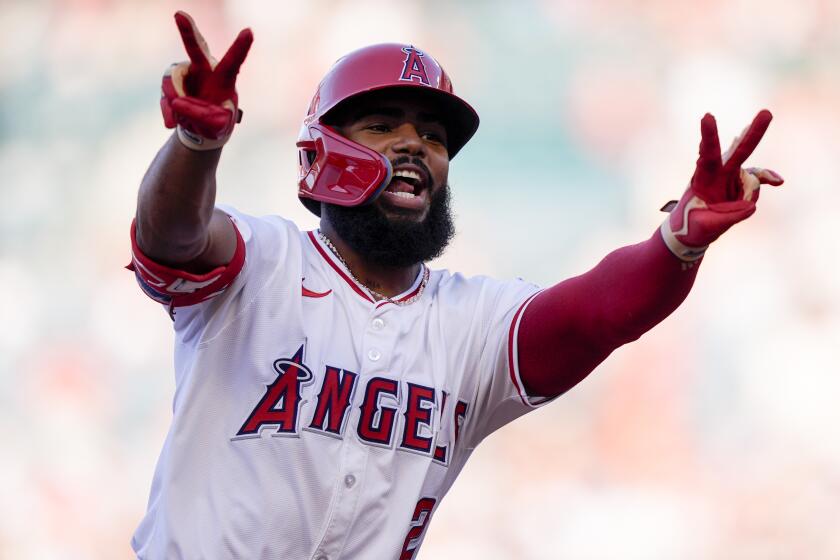BASEBALL
- Share via
CHICAGO — For those who say 101 years is plenty of time to get over an inferiority complex, meet the fans of the 2009 Chicago Cubs.
The saps can’t catch a break. Just last week, a local billionaire who spent most of last year trying to buy the ballclub got up at breakfast with the Executives’ Club of Chicago and confirmed what every Cub fan suspected deep down: That for one reason or another, owners and even would-be owners weren’t giving it their all.
“I’m actually a White Sox fan,” said John Canning Jr., who runs a private-equity firm and is a pal of baseball Commissioner Bud Selig.
“God, what a relief,” he added a heartbeat later, “not to buy the Cubs.”
Ouch.
Of course, anybody who bet the under on another World Series championship after the Cubs claimed consecutive titles in 1907 and 1908 would be as rich as Canning by now, maybe richer.
And as omens go, 1909 might have been trying to tell Cubs fans something. The club went 104-49, the most wins by a team that failed to finish first, surrendering the pennant to Pittsburgh. That same year, shipbuilders in Ireland began assembling the Titanic.
A century later, Chicago returns with what might be the best starting rotation in the National League, topped by ace Carlos Zambrano, and a lineup packed with power from leadoff man Alfonso Soriano on down. After winning 97 games and the NL Central, the Cubs plugged their largest hole by adding a left-handed bat in mercurial, not-always-durable switch-hitter Milton Bradley.
But they also let a little versatility and some bravado leave town by shipping all-arounder Mark DeRosa and starter-turned-closer Kerry Wood to Cleveland. Wood’s responsibilities have been handed over to former Florida reliever Kevin Gregg, who outpitched incumbent Carlos Marmol down the stretch this spring.
“This is not the year for younger kids to come in here and win jobs,” Manager Lou Piniella said this spring. “This is a veteran ballclub that’s ready to win now.”
OK, so Cubs managers have been saying that forever. But Piniella won it all with a less-talented team in Cincinnati nearly two decades ago, and in two seasons on the bench in Chicago, he’s guided the Cubs to back-to-back division titles for the first time in franchise history.
What he hasn’t figured out yet is how to lose the psychic baggage accumulated during all those years without a World Series title, freeing up this year’s edition to go all the way.
It’s bad enough Chicago fans have suffered through the longest championship drought in North American major pro sports. But they haven’t even sniffed the final round since 1945. That’s when restaurant owner William Sianis put the original curse on the franchise, as he and his pet billy goat were ushered out of the ballpark in the middle of a World Series matchup against Detroit that the Cubs would eventually lose.
“I don’t really buy that. Don’t buy jinxes, don’t buy any of those things,” Piniella said. “You give yourselves enough chances, sooner or later you break the barn door down and you get it done. That’s what we have to do.”
The only thing the Cubs broke last year, though, was a drain pipe on their way out of the visiting dugout at Dodger Stadium after getting swept in the NL division series by the Dodgers -- and there’s still some question who the real culprit was. Even though the organization picked up the tab for damage caused by the flooding, smart baseball people doubted it was one of the Cubs players, since during the three games against the Dodgers, they couldn’t hit anything.
“I wasn’t expecting what we got and I don’t think anybody was,” Piniella said. “I felt like I was run over by a Mack truck, I’ll be honest with you. Never once did I feel what happened to us would happen.”
Not exactly.
Out at dinner a few nights before the playoffs began, Piniella confided to White Sox owner Jerry Reinsdorf that he was worried about the lack of left-handed hitting. The Cubs led the NL in runs, on-base percentage and slugging percentage during the regular season, but eight of their top 10 leaders in at-bats were right-handed. Sure enough, Dodgers Manager Joe Torre sealed their fate by starting three righties in the division series.
General Manager Jim Hendry thought he had solved that problem last spring by adding Kosuke Fukudome, but the pricey Japanese import fizzled at the plate after a sizzling start. So this spring, Hendry pushed the restart button and brought in Bradley, who topped the AL in on-base percentage and ranked third in batting average as a designated hitter for the Texas Rangers last year.
The Cubs need Bradley to protect right-handed sluggers Derrek Lee and Aramis Ramirez in the middle of the lineup, but he hasn’t been healthy to play a full season in the outfield or pile up 500 at-bats since 2004. So naturally, Bradley tweaked a thigh muscle in his very first bat of the spring. Then he resumed tearing up opposing pitchers and nearly went after an umpire, flashing the kind of intensity that got Bradley into trouble at several of his other stops.
“Milton is a very smart guy, and I think he’s not just some guy that’s going to snap at every little thing,” Lee told the Chicago Tribune. “He’s had some episodes, but who hasn’t, really? I’ll help him out when I can and let him know what to expect.”
But Bradley assured Hendry and his new teammates that his temper is under control.
“Everywhere I go, people win,” he said. “It’s not a surprise.”
Could the solution really be that simple?
Maybe. But just to be sure, the club moved to take one more excuse off the table.
For years, even after players groused about being worn down because of too many afternoon starts in the dog days of July and August, the Cubs front office dawdled about installing lights at Wrigley. The franchise was already making money catering to an audience that reveled in being captives. Win or lose, the “Friendly Confines” were almost always packed.
Finally, though, the switch was thrown in 1988 and night baseball proved every bit as good a draw. But recently management began exploring an increase in the number of night games, from the 30 allowed under the original agreement with neighborhood groups to a total of 50.
“For the Cubs to have gone this long without winning everything, in a statistical sense, is highly unlikely to have happened by chance,” University of Chicago economist Allen Sanderson said. “So if it’s not bad luck, what is it?
“I look at incentives. . . . In the case of the Cubs’ owners, what’s the incentive to win? There was considerable TV revenue coming in, plenty of fannies in the seats, beers being sold, etc. So the question they faced was what would it cost to win a few more games, to pay for slightly better players than we have now?”
Since committing close to $1 billion of his own fortune to buy the team, the ballpark and a share of the Cubs’ cable package, winning bidder Tom Ricketts has remained in the background and largely silent. With that much skin already in the game, it certainly wouldn’t hurt to let Cubs fans know he wants to win as much as they do -- and maybe even more.
More to Read
Go beyond the scoreboard
Get the latest on L.A.'s teams in the daily Sports Report newsletter.
You may occasionally receive promotional content from the Los Angeles Times.










